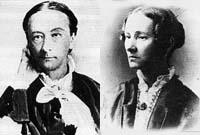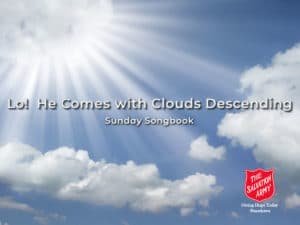Jesus Loves Me
Jesus loves me! This I know,
For the Bible tells me so;
Little ones to Him belong;
They are weak, but He is strong.
Yes, Jesus loves me;
The Bible tells me so.
Jesus loves me! He Who died
Heaven’s gate to open wide;
He will wash away my sin,
Let His little child come in.
Jesus loves me! He will stay
Close beside me all the way.
If I love Him, when I die
He will take me home on high.
 This week’s hymn is the familiar children’s one taught at an early age in most church-going families. It was first written as a poem within a children’s story by sisters Anna and Susan Warner, in New York City. In the story, “Say and Seal”, a little boy is dying. To comfort him, his Sunday School teacher holds and rocks him and makes up this song. After the novel became a best-seller of the time (second only to “Uncle Tom’s Cabin”), in 1860 hymnwriter William Bradbury composed a childlike melody for the poem, turning it into the best-known children’s hymn on earth!
This week’s hymn is the familiar children’s one taught at an early age in most church-going families. It was first written as a poem within a children’s story by sisters Anna and Susan Warner, in New York City. In the story, “Say and Seal”, a little boy is dying. To comfort him, his Sunday School teacher holds and rocks him and makes up this song. After the novel became a best-seller of the time (second only to “Uncle Tom’s Cabin”), in 1860 hymnwriter William Bradbury composed a childlike melody for the poem, turning it into the best-known children’s hymn on earth!
 For forty years, Anna and Susan Warner conducted Bible classes for cadets at West Point Academy. They were both buried with full military honours – the only civilians ever buried in the military cemetery at West Point. Today their home on Constitution Island is maintained by West Point as a museum in their memory. What a tribute to these Christian women!
For forty years, Anna and Susan Warner conducted Bible classes for cadets at West Point Academy. They were both buried with full military honours – the only civilians ever buried in the military cemetery at West Point. Today their home on Constitution Island is maintained by West Point as a museum in their memory. What a tribute to these Christian women!
Words: Anna B. Warner Music: William B. Bradbury
S.A. Song Book #843 Section: The Young Salvationist – Childhood
Reference: Robert J. Morgan, Then Sings My Soul
YouTube – Jesus Loves Me by Bramwell Tovey ENJOY
https://youtube.com/watch?v=qfDUYyks7BA%26rel%3D0%26w%3D640





